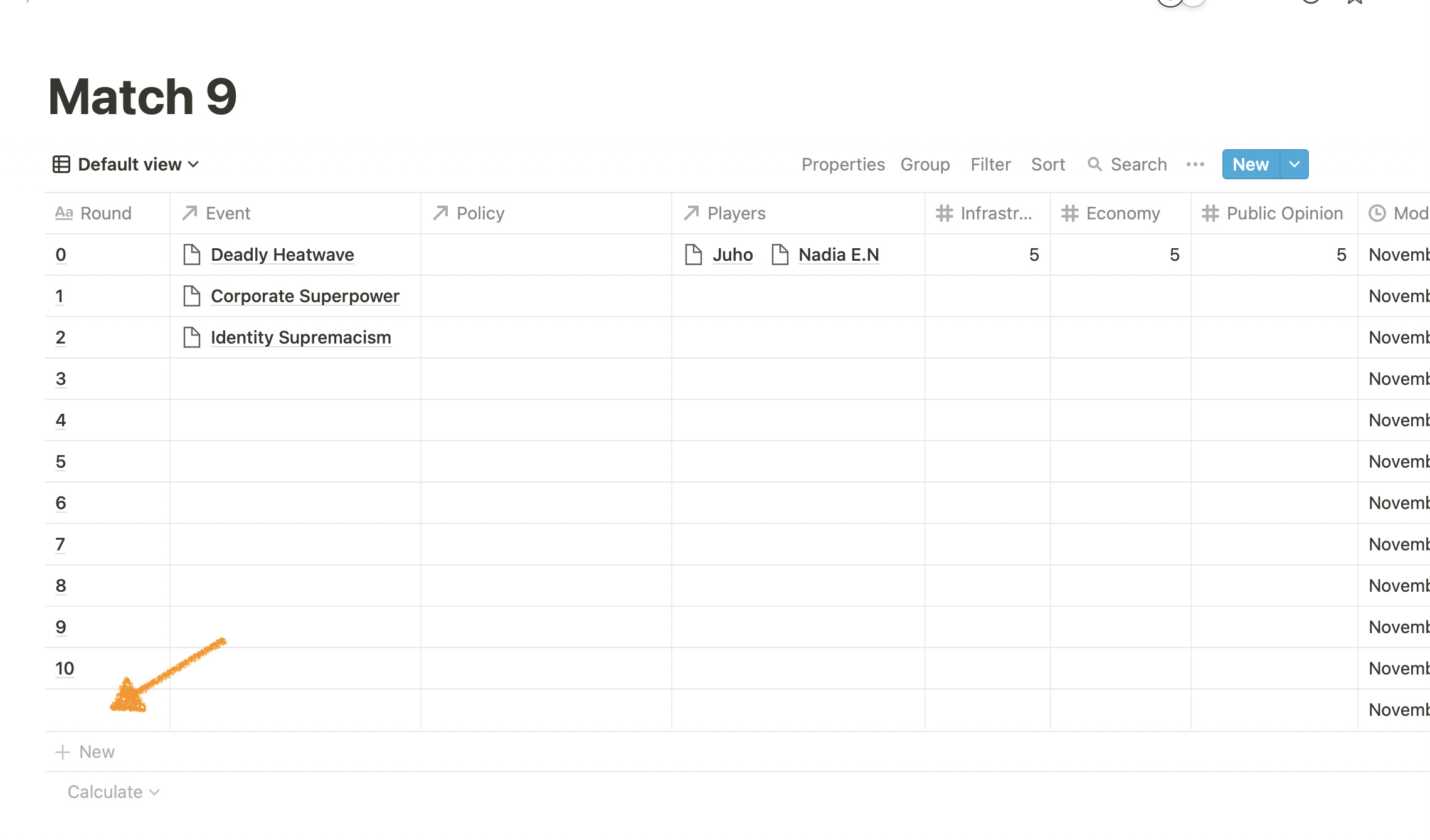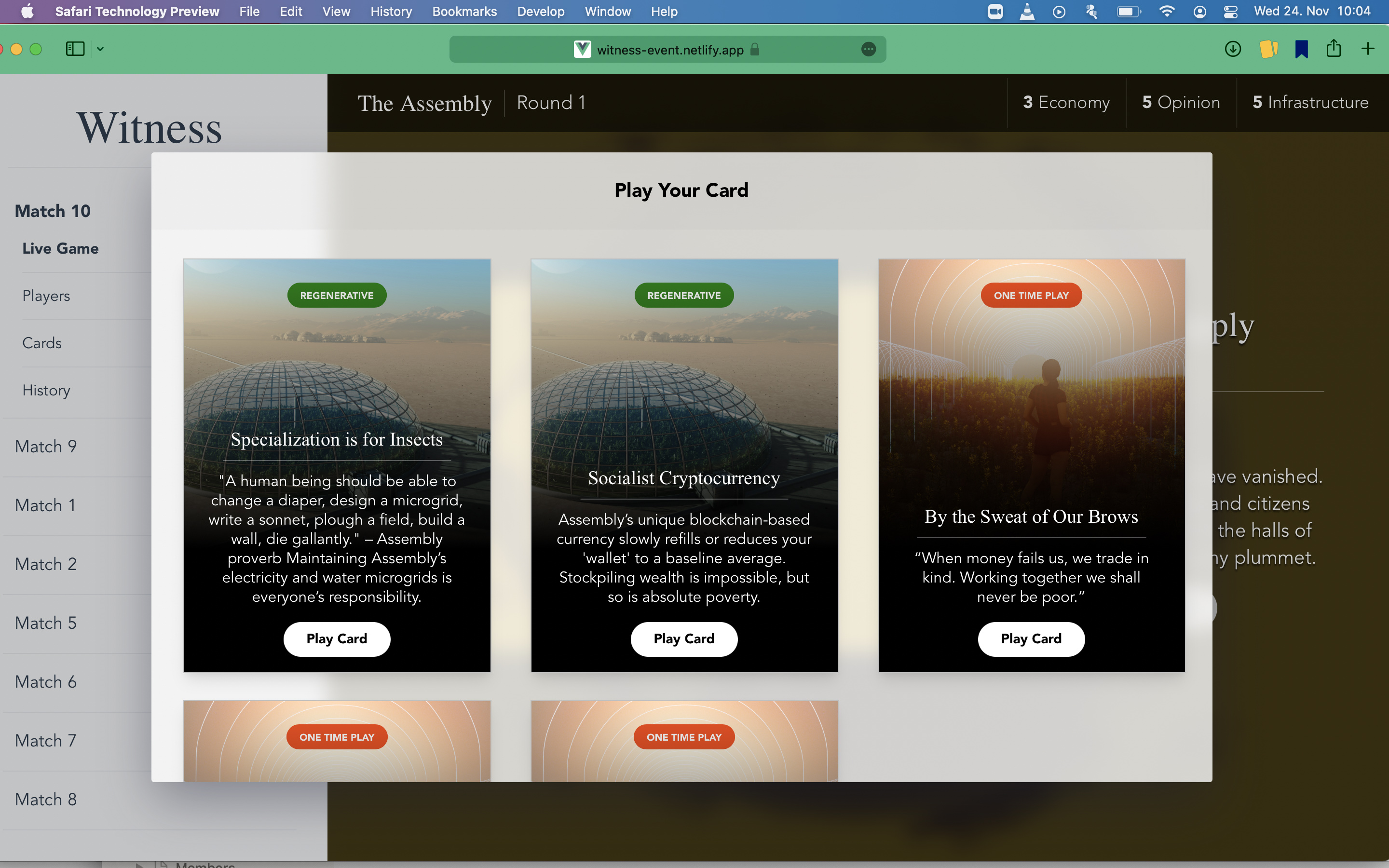Sure, what is on Owen is the working host interface and the card dimension
No worries and I understand. I think that any failure to load the page is down to someone each morning creating a blank row in a database — such as this very morning around 08:00 (below row 10):

Today it was in Match 9 - yesterday it was an empty user, and the time before it was an empty policy card.
This is no one’s fault - but I have to point out the pattern each time is the same.
So to avoid problems loading the page, please just make sure that when you create a row, whether it’s a policy, match round, user or event - that you do not leave it blank.
Yes, I deleted it as Match 9 link was in this cell - both in Template sheet and Match 9 sheet. I deleted only the link, but not the row
No worries - and I can see it was in the template as well, not your fault at all.
But 99% of the crashes come down to this. I’m looking into making it ignore any false entries, but for now we have to be a little vigilant about it.
Also I’ll join the call this morning to see how you interact with it and if any problems arise.

still larger text needed…
I volunteer as a distrikt aethnographer.
Hey, Frank - noted. It would be important if you could join us Thursday and Friday for the testing sessions to get accustomed with the coreography.
They are at 10 AM and 6 PM CET - sent you the link via mail.
I have pushed the changes we talked about this morning.
@nadia send me a message about 9am if there are any issues, I can’t do a call at that time but I’ll have my phone ready to respond and if there are urgent bugs/fixes I will address them on the train with my laptop before 10.
Hello,
here is the recording of the last session.
New things introduced are:
3/4 instead of 9 breakout rooms
all the cards present instead of 5
monday 9 AM CET - general rehearsal
I will prepare the list of roles and responsibilities once I have confirmed all the hosts
@alberto this is the same experience I had when participating in the test game yesterday. Luckily you helped us as an advisor to understand what the effects of playing a certain card might have - but still this odd feeling remained: it’s more like rolling a dice than making a well informed decision.
Agree!
Great idea. In yesterday’s test game there where too many people acting as decision makers. Splitting the participants in decision makers and visitors might make sense and let them exchange their experience after or even during the game. Visitors may be kind of ambassadors - linking to and learning from other districts.
That observation by Matthias was a bit of an epiphany for me. “Yes! – I thought – That’s just what real-life policy making feels like, especially in deep crises.” We tell each other stories: “it’s all about the track-and-trace”, “we need to reduce inflation”, and so on. And our action do something, often even what we intended them to, but system adjustment can erode our gains, or create trouble somewhere else. I tried to transmit this idea to the Covenant breakout room yesterday.
OK thoughts - on policy choices the group were pretty unsure of what policy choices were likely to influence, so that meant policy choice was pretty haphazard. You could say that’s reflective of reality - people just vote their affections and prejudices - or that the selectorates should have better information on likely outcomes?
The related would be the role of the ‘concierge’ class to the advisors - they gatekeep knowledge on outcomes. Anyone watch ‘yes, minister’? Civil servants were more influential than they might admit, and presumably had their own agenda 
From an off-platform discussion with a participant in yesterday’s event:
P: That was cool, thanks! I might have a couple ideas to share as feedback. To make sure i don’t waste your time, I’d need at least a simple statement about what type of dynamic you want to promote and what would be the objective from a player perspective.
Me: (in the long run): Creating a canvas for futures proofing/ planning. You have the thing you care about, and you have a setting within which you can explore, develop and stress-test it in different systems. The dynamics we want are: people can approach issues from different angles (e.g response to a specific kind of crisis , or a specific topic they want to explore/understand/develop). And see how it connects to other issues/concerns
P: Do you want to push for collaboration, cooperation, competition, individualism, or continuous engagement?
Me: Co-Alignment, cooperation. For example it could be: Seeding and speeding up evolution of networks into clusters. What I mean by this: Long-term thinking in economics: reflecting on the experience of the Messina advanced cluster
P: One off or on a continuous basis? The current cards based setup seems oriented towards the single session game mode. But the multiple rounds seems to invite to more complex dynamics. I’d say it can go both ways from here, but you’d still need to pick one.
Me: I would see it as a process of a series of events/game play sessions. Almost like a recurring game night.
P: I feel there are mainly two things missing or at least needing improvement in the version we played today (apart from the interface bug, which of course I won’t even consider as it’s too early).
-
an antagonistic component. You’re given a challenge to tackle, but it’s like if in LOTR you had the company of the ring with no orcs nor Nazgul nor dark wizard. It felt like we were basically all trying to do our reasonable best with no “hostile” factor. If the game assumes that we’re all there to make things work, most players will just do that and accommodate each other, especially as the stakes are 0. This makes for a very pleasant interaction but an underwhelming game to play more than once.
-
A clear but not too predictable action\reaction sequencing. If we are given an initial scoring, a target, and cards with specfic scoring to achieve our goal, it’s basically just a matter of running the math.
P: Do you have the gameroll or gameplay structure written somewhere? With scores and steps? I also might have some suggestions but first I’d need to know how the system is designed in detail.
Anyone listen to ‘The men from the Ministry’? Hilarious stuff… Just had to share BBC Radio 4 Extra - The Men from the Ministry - Next on
Agree. But if I have to rely on my experience and intuition to make such decisions I would need to be involved deeply with the story of the district (and share the core values of the community). This can not be done by dropping me randomly in a district and pushing me to make decisions. Actually I would refuse to join such a decision board until I am familiar enough with the community which will be affected by the decisions of the board.
Where we seem to be going is this: Witness wants to be narrative, I think they are called world-building games (@IvanV told me about them, and even played The Quiet Year with me), but world-building games are played with small groups (3-5 people), and take time.
In yesterday’s session we tried to combine the narrative elements of a world-building game with a hit-points based game mechanics, a large group and a short time. Maybe we should drop the hit points altogether, and just go full narrative.